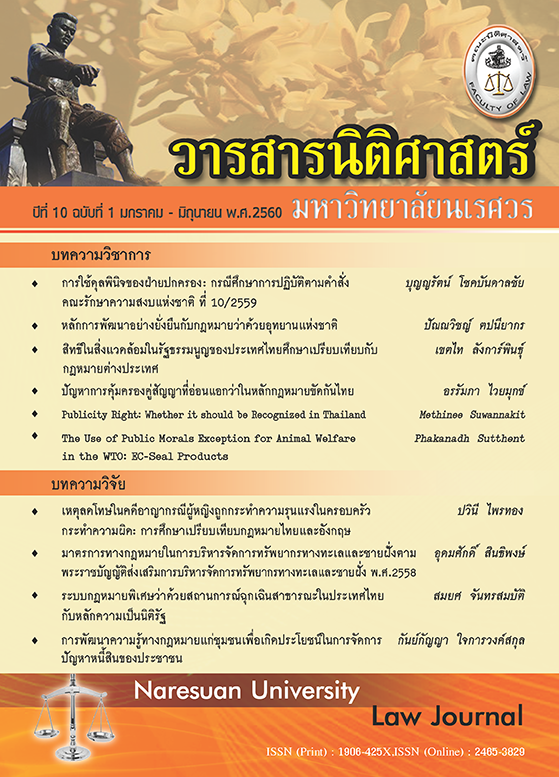Publicity Right: Whether it should be Recognized in Thailand
Main Article Content
Abstract
At present, celebrities in Thailand are being used broadly for commercial purposes without their consent. Thai existing laws such as defamation, passing off and copyright are insufficient to protect celebrities’ interests, especially, their economic interests. Accordingly, this article will study the right of publicity, which emerged and was separated from the privacy right in the U.S., in order to protect celebrities’ interests. In addition, the article will further explore other varying approaches in different countries such as the extended tort of passing off, misrepresentation and misappropriation of personality. Next, the publicity right will be emphasized as the best approach to protect celebrity rights. Then, it will discuss Thai existing laws before arguing that right of publicity should be recognized in Thailand. Moreover, this article will suggest some limitations of the publicity right in order to balance celebrities’ interests with the public interest.
Article Details
References
Beverley-Smith, Huw. The Commercial Appropriation of Personality. Cambridge Studies in Intellectual Property Rights. Cambridge, UK: Cambridge University Press, 2002.
Boonyarat Chokebandanchai. “The Report of Media Interfering with the Administration of Justice.” Naresuan University Law Journal 6, no. 1 (2013): 107-129. [In Thai]
Boyd, Stephen. “Does English Law Recognise the Concept of an Image or Personality Right?.” Ent. L.R. 13, no. 1 (2002): 1-7.
Cameron, Euan. “Major Cases.” International Review of Law Computers & Technology16, no. 2 (2002): 211-218.
Chaiyos Hemaratchata. Characteristics of Intellectual Property Law. 9th ed. Bangkok: Nititham, 2012. [In Thai]
Chin, Kevin L. “The Transformative Use Test Fails to Protect Actor-Celebrities’ Rights of Publicity.” Northwestern Journal of Technology and Intellectual Property 13, no. 2 (2015): 197-198.
Heberer, William M. III. “The Overprotection of Celebrity: A Comment on White V. Samsung Electronics America, Inc.” Hofstra Law Review 22, no. 3 (1994): 729-772.
Hoke, Breanne. “My Online Me: Why Gamers Should Turn to California’s Right of Publicity Laws in Protecting Their Online Avatars.” American UNIV. Intellectual Property Brief 6, no. 1 (2015): 27-52.
Keel, Astrid, and Rajan Nataraajan. “Celebrity Endorsements and Beyond: New Avenues for Celebrity Branding.” Psychology & Marketing 29, no. 9 (2012): 690.
Khaosod English. “Thai Celeb to File Charges over ‘Hooker’ Book.” Last modified May 6, 2014. Accessed March 30, 2016. https://www.khaosodenglish.com/detail.php?newsid=1399379253.
Krairoek Sasemsarn. Explanation of Thai Criminal Code Section 288 – 366. Bangkok: The Institute of Legal Education Thai Bar Association, 2008. [In Thai]
Madow, Michael. “Private Ownership of Public Image: Popular Culture and Publicity Rights.” Cal. L. Rev. 81, no. 1 (1993).
Manager Online. “Duan Could Make Profits as She Look Alike Aum.” Last modified 2015. Accessed May 2, 2016. https://www.manager.co.th/Entertainment/ViewNews.aspx?NewsID=9580000062259.
McCracken, Grant. “Who Is the Celebrity Endorser? Cultural Foundations of the Endorsement Process.” Journal of Consumer Research 16, no. 3 (1989): 310-21.
Nimmer, Melville B. “The Right of Publicity.” Law & Contemporary Problems 19, no. 2 (1954): 203-204.
Ralston, Scott. “Australian Celebrity Endorsements: The Need for an Australian Right of Publicity.” Communications Law Bulletin 20, no. 4 (2001): 9-12.
Redish, Martin H., and Kelsey B. Shust. “The Right of Publicity and the First Amendment in the Modern Age of Commercial Speech.” Willam & Mary Law Review 56, no. 4 (2015).
Rice, Garrett R. “Groove Is in the Hart”: A Workable Solution for Applying the Right of Publicity to Video Games.” Washington & Lee Law Review 72, no. 1 (Winter 2015).
Rothman, Jennifer E. “Copyright Preemption and the Right of Publicity.” UC Davis Law School Review 36 (2002): 199-204.
Smedley, Christina. “Commercial Speech and the Transformative Use Test: The Necessary Limits of a First Amendment Defense in Right of Publicity Cases.” DePaul Journal of Art, Technology & Intellectual Property Law 24, no. 2 (Spring 2014).
Warren, Samuel, and Louis Brandeis. “The Right to Privacy.” Harvard Law Review IV, no. 5 (December 1890): 193-220.
Wuttipong Wedchayanon. “Copyright, Performing Right: A Case Study of Noi Bussakorn.” Last modified 2010. Accessed January 21, 2016. https://www.bloggang.com/viewblog.php?id=boxxcatt&date=22-06-2010&group=1&gblog=5.


